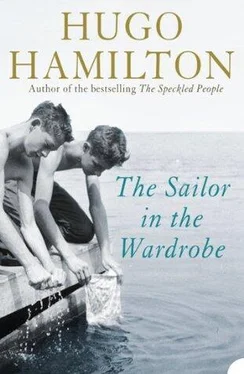The lands around the house in Wiesbaden where the American officer and his family lived were guarded by soldiers and patrols in army jeeps. Every time my mother walked down the hill to the gate, her bag was searched, so she began to conceal food inside her clothes. She held a piece of cheese or meat under her cardigan. Sometimes she hung a small parcel of bread and left-over fat in a small piece of cheesecloth under her arm and walked past the checkpoint knowing that if she was caught, she would lose her job and have nothing.
One day, she had two bars of soap concealed in her stockings, at the back of her legs. She had to walk carefully to make sure the soldiers didn’t notice anything. As she walked past the checkpoint, the soldiers smiled and tried to talk to her. She knew they always looked at her legs when she continued on down the hill. She tried to walk as elegantly as possible, but then the bars of soap started slipping down inside her stockings and the soldiers must have thought German women had a funny way of going downhill. She couldn’t stop the soap slipping with her hands. Any minute, the soldiers would see two lumps sliding down around her ankles, so she put her foot up on a fence and started adjusting her stockings one by one, as if she was doing it deliberately for them. My mother says they must have imagined everything underneath her dress except the soap. Then she walked away, around the corner out of sight. After that the soldiers were friendly to her and even let her out without checking her bag. Every day, more food was being delivered to the house and every day, more and more was going back out again to feed people in Mainz.
At one time, when the officer and his family went back to America on their summer holidays, the soldiers on guard duty even allowed her to bring people into the house, to help her clean up. There was plenty of food left for three weeks, so my mother invited everybody she knew up to Wiesbaden as if it was her own place. They stayed overnight and slept in all the big beds. And when the food started running out, she decided to use up the last of it in one big party. Stefan’s mother and father came. Tante Elfriede and Onkel Adam were there as well. They all went through the rooms and lived for one evening as if they were rich Americans, putting on dresses and suits belonging to the officer and his wife, looking at themselves in the mirror and holding a fashion parade. They lit candles and had a big dinner in the dining room, with cigars from Cuba and French cognac. They put on swing music and danced around the living room. They even spoke in English to each other, my mother says, and they were laughing so much that they often had to hold on to the furniture. But then the party came to a sudden end when the family arrived back early and the house was thrown into a terrible chaos. A phone call came from the station in Wiesbaden to say that they were on their way.
The celebration turned to panic. They turned the music off and ran upstairs to put all the clothes back into the wardrobe. There was such confusion that my mother crashed head-first into her sister on the landing, and even then they could do nothing but hold on to the banisters and start laughing again until they suddenly remembered the trouble they were in. Onkel Adam went around opening all the windows in the house. The others carried things from the dining room into the kitchen, running. My mother says she has never seen the washing up being done so fast in her life. At the last minute, her secret guests all fled out the side door and my mother only had ten minutes to walk around the house closing all the windows again before the family arrived at the door in their big American car.
She doesn’t know how they could not have known there had been a party. They must have thought my mother was smoking cigars on her own just to keep a good atmosphere in the house. There was nothing out of place, except that there was not one piece of food left over and the officer’s wife said it was about time they got back. My mother was expecting trouble but the Americans were so friendly that when they finally left Germany, they begged her to come and live in their big house in Vermont. They would send her to university. They allowed her time to make up her mind, but she decided to stay close to her own family. They left the address in Vermont and told her that if she ever changed her mind, they would get her a ticket and a visa so she could start afresh in America.
It would have been a good life there. The Americans are very much like the Germans, she says. But then she would never have made it to Ireland. My father would have been an American and we would never have had to learn Irish. We would have been speckled people, but we would never have spoken any German, because it was a time when nobody wanted to be German and nobody wanted to hear German spoken on the street. Sometimes I think about how different our lives would have been with another father, an American father or an Irish father who spoke English to us. My mother imagines what it would have been like, that other life without my father, but she says you cannot regret things too much or you will find yourself going backwards in time and unable to move forward again.
The people in Mainz never forgot how my mother risked everything to keep bringing them food during the war and those famine years. The parents of her school friend Käthe wanted to give her some kind of gift when she finally decided to go away to Ireland. They had no money, and no belongings that could be sold on the black market. My mother didn’t want any payment for the help she gave, but Uncle Ulrich’s family was so grateful that they decided to give her an ancient book which had belonged to them for hundreds of years.
It was of no value. It could never be sold, nobody would have given even a loaf of bread for it at that time. They knew that my mother liked books, that it would be in good hands. My mother thought it was too precious for her to keep, but they forced her to take it, for all her kindness.
I’ve seen her holding the book in her hand, leafing through it as if it no longer belongs to her. I’ve seen her crying, maybe not because she might lose the book, but because what she did that time back in Wiesbaden has no value any more. Maybe that’s why she was so shocked that her cake was not accepted, because she remembers the time when people were starving and would have given anything for a piece of that cake. It was hard to believe that there was so much cake around now that people could refuse it. Hard to believe that a piece of cake could ever have been more valuable than a book from the time of Gutenberg. She would never dream of selling it and making money from it. It was one of the first printed books in the world, but that wasn’t the same as thinking it would make you rich overnight. When my mother talks about being rich, it’s not about money or houses and cars but always about having children and having an imagination, about listening to music and holding precious books in your hand.
Will she give it away or not? One minute she fights back and says she will never let go of this book. She wants to know what right they have to demand such a thing or to claim that she was just keeping it safe for them in Ireland. She feels she has no right to keep it. All she did was help people and that’s not something for which you deserve payment. It brought its own rewards and she would be glad to do it again, any time, for nothing. But now she shuts her eyes as if the memory has no value any more, as if something that was still so recent in her own mind had been suddenly wiped away. She was beginning to think it never happened at all. Maybe the book has become so valuable in itself that it has wiped out all memory, all the laughter, all the joy of being alive after the war, all the innocence of that once-in-a-lifetime friendship.
Читать дальше
Конец ознакомительного отрывка
Купить книгу












